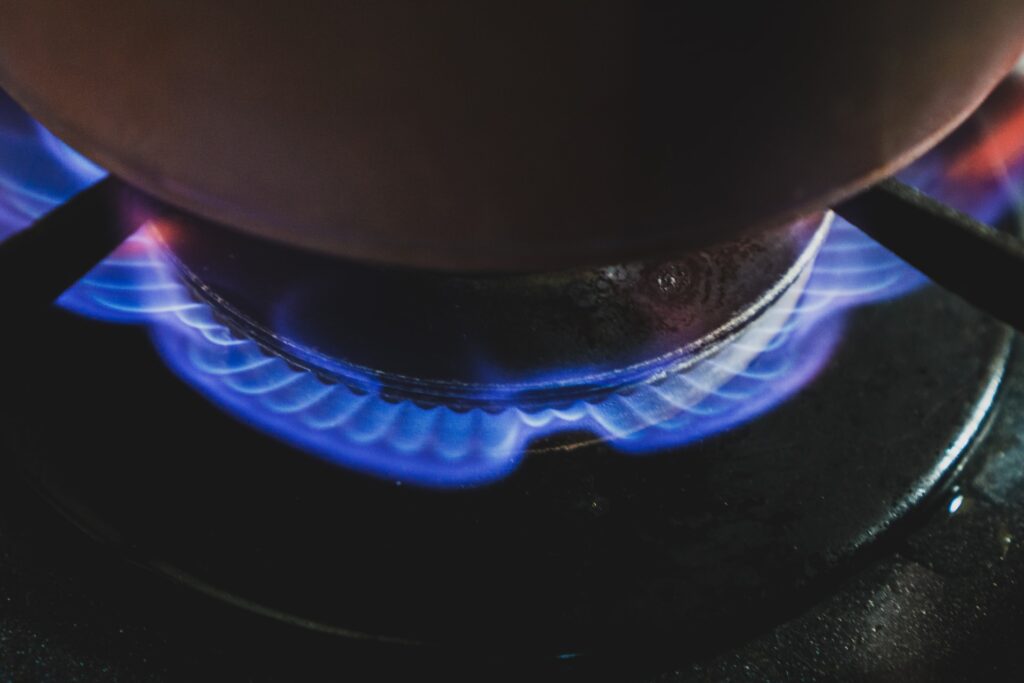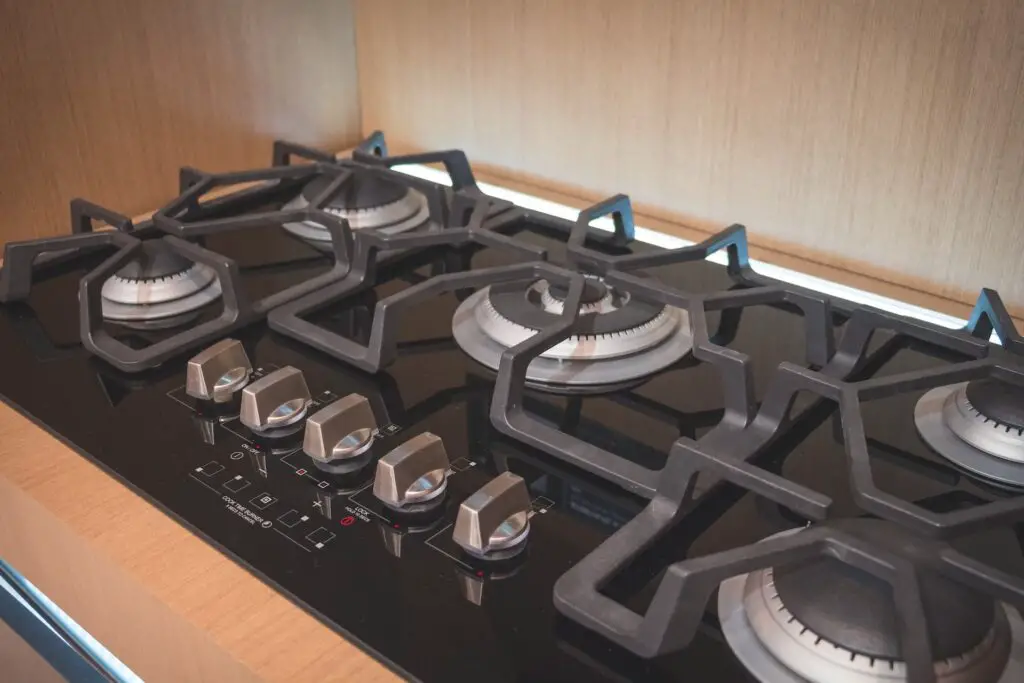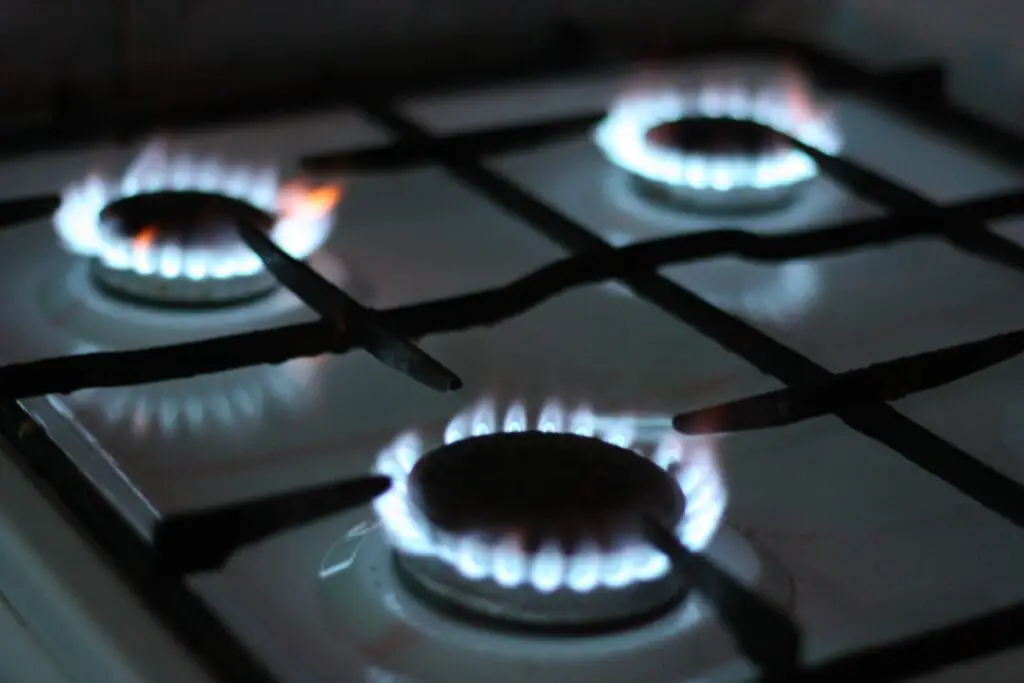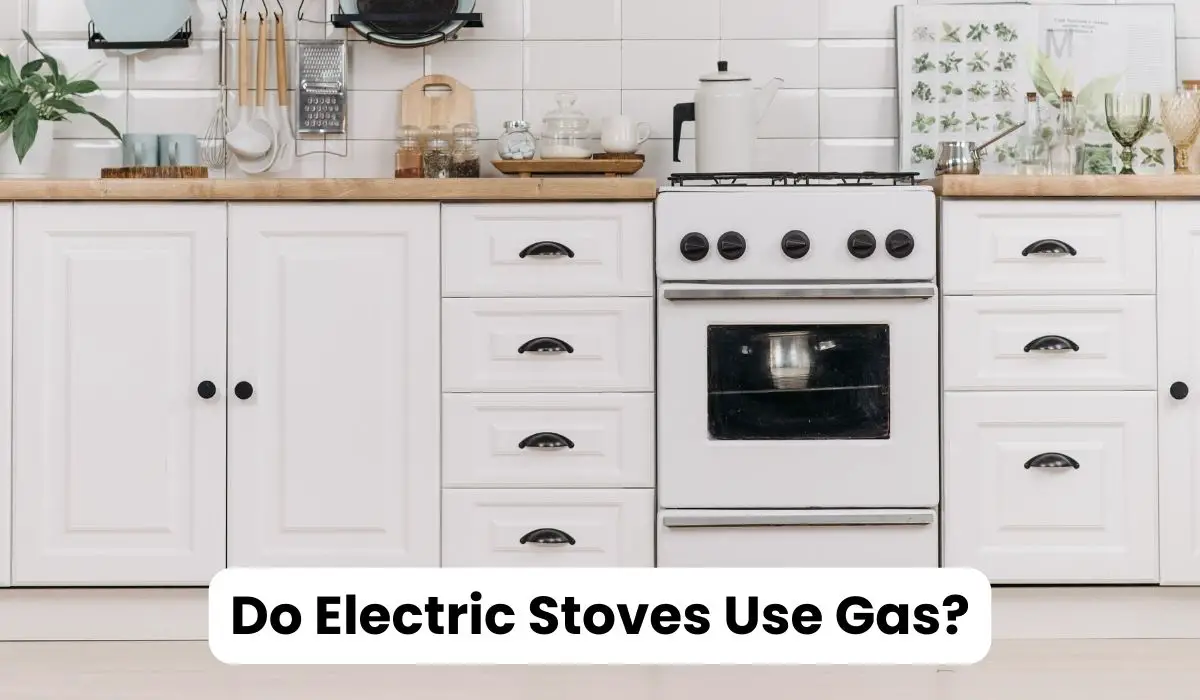In today’s modern kitchens, the choice between electric and gas stoves is a common dilemma. The type of stove you choose can significantly impact your cooking experience, energy consumption, and even safety.
If you’ve ever wondered, “Do electric stoves use gas?” or if you’re curious about the differences between electric and gas stoves, you’re in the right place. In this article, we will explore the intricacies of electric stoves, clarify whether they use gas, and provide a comprehensive comparison between electric and gas stoves.
Table of Contents
What are Electric Stoves?

Electric stoves are kitchen appliances that use electricity to generate heat for cooking. They are a modern and convenient alternative to traditional gas stoves. Many households prefer electric stoves due to their ease of use and precise temperature control.
At the heart of an electric stove is a heating element, usually made of coils or a smooth ceramic surface. When you turn on the stove, electricity flows through these elements, causing them to heat up. The heat generated is then transferred to the cookware placed on top of the stove.
One of the advantages of electric stoves is that they are easy to clean. Since there are no open flames or gas burners, spills are less likely to cause a mess, and you can wipe the smooth surface clean.
Electric stoves come in various designs, including freestanding and built-in models. Some even have advanced features like digital controls and timers. They are a safe and efficient way to prepare food, making them a popular choice for home cooks of all ages. So, whether you’re boiling water for pasta or simmering a delicious sauce, electric stoves are there to make your cooking experience easier and more enjoyable.
Do Electric Stoves Use Gas?

No, electric stoves do not use gas. They work completely differently. Electric stoves use electricity to make heat for cooking, while gas stoves use natural gas or propane.
Electric stoves have special coils or a smooth ceramic surface on top. When you turn them on, electricity flows through these coils or the ceramic surface, and they get hot. Then, you put your pots and pans on top of these hot coils or the smooth surface, and that’s how your food gets cooked. It’s like magic.
On the other hand, gas stoves have burners with open flames. They use gas like natural gas or propane to create these flames, which heat your pots and pans. So, gas stoves need a gas supply to work.
Both electric and gas stoves have their pros and cons. Electric stoves are easy to clean and control the temperature precisely, while gas stoves heat up and cool down faster. So, they’re different but equally handy for cooking up yummy meals! Just remember, if you have an electric stove, it doesn’t use any gas.
What are Gas Stoves?

Gas stoves are super cool kitchen appliances that use gas to make things hot for cooking. They’re like magic fire-makers for your pots and pans.
Here’s how they work: Gas stoves have burners with unique holes where gas comes out. When you turn on the stove, you also turn on the gas. Then, when you light it up, flames appear at the burner holes. These flames are what heat your cookware.
Gas stoves are neat because you can control the heat really quickly. If you want to cook something fast, you can turn up the flames high, and if you need a gentle simmer, you can lower the flames. That’s why many chefs love using gas stoves – they’re like a secret weapon for making delicious meals.
But remember to be careful because gas is flammable, which means it can catch fire easily. So, grown-ups usually handle lighting and turning off the gas.
Do Gas Stoves Use Electricity?
Yes, gas stoves do use electricity, but not in the way you might think. They don’t need electricity to make flames or cook your food, but they use a little bit of it for some unique features.
Here’s how it works: Gas stoves have electronic ignition systems. When you turn the knob to light a burner, it sends a tiny electric spark to ignite the gas. This spark is like a tiny bolt of lightning that starts the flame. So, in that moment, electricity is used to start the fire.
Gas stoves also often have oven lights, timers, and some fancy digital displays. These parts use electricity too. The oven light helps you see what’s cooking inside, and the timer helps you keep track of cooking times.
But here’s the exciting part: Once the gas burner is lit, it doesn’t need electricity to keep burning. It’s all about the gas doing the work.
In short, gas stoves do use a bit of electricity to get started and for extra features, but most of the cooking power comes from the gas. It’s a mix of gas and electricity working together to make yummy meals.
Electric Stove vs Gas Stove – Which is Good For Cooking?
Electric stoves and gas stoves are like two superheroes in the kitchen world, each with its special powers. Let’s see which one might be the best for you.
Electric Stove:
Pros:
Easy to Clean: Electric stoves usually have smooth surfaces, so spills are easy to wipe away. No messy grates or burner caps.
Precise Temperature: You can control the heat very precisely with electric stoves, which is excellent for delicate dishes.
Safety: There are no open flames, making it safer, especially if you have little ones around.
Cons:
Slower Heating: Compared to gas stoves, electric stoves take longer to heat up and cool down.
Energy Use: They are energy-efficient because it takes time for the electric coils to heat up and cool down.
Unique Cookware: Some cookware, like cast iron, might not work as well on electric stoves because they need direct flame contact.
Gas Stove:
Pros:
Quick Heat: Gas stoves heat up super fast and cool down quickly too. It’s like having instant heat at your fingertips.
Even Cooking: The flames spread evenly under your pots and pans, so you get consistent cooking results.
Works During Power Outages: Gas stoves can work even when the power goes out because they don’t rely on electricity to keep the flame going.
Cons:
Tricky to Clean: Gas stoves have burners with grates and burner caps that are trickier to clean than smooth electric surfaces.
Safety Concerns: There are open flames, which can be risky, especially if you’re not careful. It would help if you were cautious with gas stoves.
Less Precise: It can be harder to control the heat very precisely on a gas stove, especially at lower temperatures.
So, which one is better for you?
If you’re a Beginner Chef:
If you’re starting to learn how to cook, an electric stove might be a good choice. They’re safer because there are no open flames, and they offer precise temperature control, which can be helpful when you’re mastering recipes. They are easy to clean, so you can focus on cooking without worrying about messes.
If You Love Quick Cooking:
If you’re a fan of fast cooking and want things to heat up in a flash, a gas stove is your kitchen sidekick. They provide instant heat, which can be a game-changer when you’re in a hurry. Just be sure to handle them with care due to the open flames.
If You Live in an Area with Frequent Power Outages:
Gas stoves have an advantage during power outages because they don’t rely on electricity to keep the flame going. So, if you live in an area where power cuts happen often, a gas stove might save the day when you need to cook.
If You’re a Cooking Pro:
Experienced chefs often prefer gas stoves because they can handle the sometimes less precise heat control for the benefit of quick and even cooking. If you’re already a cooking pro, a gas stove might be your kitchen weapon of choice.
If You Have Special Cookware:
Consider the type of cookware you have. Some materials, like cast iron, work better on gas stoves because they need direct contact with flames. If you have specific cookware preferences, make sure your stove can accommodate them.
If You Want the Best of Both Worlds:
Some kitchens even have dual-fuel ranges, which combine both electric and gas burners in one appliance. This way, you get the benefits of both types of stoves. However, they can be more expensive and might require a gas line installation if you still need to get one.
Remember, the “best” stove for you really depends on your cooking style, experience, and personal preferences. Some people even switch between electric and gas stoves depending on what they’re cooking that day. So, think about what matters most to you in the kitchen and choose your kitchen superhero accordingly.
Benefits of Using Electric Stoves:

1. Safety First
Electric stoves are like the safety superheroes of the kitchen. They don’t have open flames, so there’s less chance of accidents. No flames mean fewer burns and fires, which is excellent, especially if there are curious kids around.
2. Easy to Clean
Cleaning up after cooking can be a breeze with electric stoves. Most of them have smooth surfaces that are simple to wipe clean. You won’t need to scrub grates or worry about food falling into burners.
3. Precise Cooking
Electric stoves are excellent at controlling temperature. You can set them to just the proper heat for your cooking needs. It’s like having a thermostat for your pots and pans, which makes it easier to cook delicate dishes.
4. Energy Efficiency
They are pretty energy-efficient, especially the smooth-top electric stoves. Once they get hot, they stay hot, which means less energy is wasted. It’s good for the environment and your wallet.
5. Even Heating
Electric stoves provide even heat distribution across your pots and pans. Your food gets cooked consistently, so no more worrying about one side burning while the other side stays cold.
6. Compatibility
Electric stoves work well with all kinds of cookware, from stainless steel to glass or ceramic. You don’t need unique pots and pans, making it super convenient.
7. Less Noise
They are quieter compared to gas stoves. You won’t hear the hissing of gas or the clicking of igniters.
8. Modern Features
Many electric stoves come with cool modern features like digital displays, timers, and touch controls. These make cooking more fun and convenient.
9. No Gas Line Needed
You don’t need a gas line in your home to use an electric stove. If your house doesn’t have a gas connection, electric stoves are an easy choice.
10. Good for Baking
Electric ovens, which are often part of electric stoves, are loved by bakers. They offer consistent, even heating, making your cakes and cookies turn out just right.
So, if you want a safe, easy-to-clean, precise, and energy-efficient way to cook, an electric stove could be your kitchen buddy. It’s like having a superhero on your side, making your cooking adventures more enjoyable and hassle-free.
Benefits of Using Gas Stoves:

1. Speedy Cooking
Gas stoves are like the superheroes of quick cooking. When you turn them on, the flames come to life instantly. That means you can start cooking in a snap, which is great when you’re hungry and can’t wait long.
2. Precise Control
Gas stoves let you control the heat with a twist of the knob. If you want to cook something gently, turn the flame down low. If you need fierce heat, crank it up high. It’s like having a power meter for your pots and pans.
3. Even Heat Distribution
The flames under your cookware spread evenly, which means your food gets cooked uniformly. No more hotspots or unevenly cooked meals.
4. Works During Power Outages
Imagine the electricity goes out, but you still want a hot meal. That’s where gas stoves shine. They don’t need electricity to keep burning, so you can keep cooking even when the lights go out.
5. Perfect for Flame-Required Cooking
If you love dishes that need direct flame contact, like stir-frying or using a wok, gas stoves are the best choice. The flames dance right under your pan, giving you that sizzle and flavor.
6. Easy-to-See Flames
You can see the flames, which can be handy. You’ll know if the stove is on or off just by looking, reducing the chances of accidents.
7. Traditional Feel
Some folks love the traditional and cozy feel of cooking with gas. It’s like cooking over a campfire but indoors. It can make you feel connected to old-timey cooking methods.
8. Great for Professional Chefs
Many professional chefs prefer gas stoves because they provide quick heat changes. Chefs need to control their cooking precisely, and gas stoves offer that control.
9. Easy to Clean Burners
While the grates and burner caps might take a little more effort to clean, the burners themselves are simple to keep tidy. You can remove them quickly and give them a good wash.
10. More Affordable Energy Source
Using a gas stove can save money on energy bills as gas is cheaper than electricity.
So, if you’re all about fast, precise, and flexible cooking, a gas stove could be your kitchen hero. It’s like having a trusty sidekick that helps you whip up delicious meals in no time. Just remember to handle the flames with care, and you’ll be a cooking superstar.
Conclusion:
In the debate of “Do Electric Stoves Use Gas?” the key takeaway is that electric stoves do not use gas in any way. They rely solely on electricity for cooking. When choosing between electric and gas stoves, consider your cooking preferences, kitchen setup, and energy availability to make the best decision for your household.
Remember that both types of stoves have their pros and cons, so it ultimately comes down to your specific needs and preferences. Whether you opt for the instant heat of a gas stove or the even cooking of an electric stove, make sure to maintain and use your appliance safely for a satisfying cooking experience.
FAQs
Are Electric Stoves Safer Than Gas Stoves?
Both electric and gas stoves have safety features, but electric stoves may be considered slightly safer due to the absence of an open flame. However, safety largely depends on proper usage and maintenance.
Which Is More Energy-Efficient, Electric or Gas Stoves?
Gas stoves are often more energy-efficient because they provide instant heat and allow precise temperature control. However, the overall efficiency can vary depending on your cooking habits and the energy source available.
Do Gas Stoves Require a Gas Line Connection?
Yes, gas stoves require a gas line connection to provide the necessary fuel. You’ll need a gas line installed in your kitchen to use a gas stove.
Can I Convert My Electric Stove to a Gas Stove?
Converting an electric stove to a gas stove is a complex process that requires professional installation. It may not be feasible or cost-effective in many cases.



